After 2050, the level of the Caspian Sea will start to rise again, says Azerbaijani scientist. Western ecologists predict catastrophic scenarios regarding the decline in the level of the Caspian Sea. According to their predictions, by the end of the century, the water level in the sea will be 9-18 meters lower. It means that the sea will dry up by about 30 percent.
However, the forecasts of the head of the department of the Institute of Geography of the National Academy of Sciences of Azerbaijan, Doctor of Geographical Sciences, Professor Amir Aliyev are optimistic. He says, by 2050, the sea level will drop by 3 meters. However, after 2050, the sea level will rise again. The professor emphasized that these data are based on archaeological excavations and scientific results.
“Observations over the Caspian Sea have been being carried out since 1837. During this period, the sea level changed dramatically by 3 times: from 1929 to 1977, the sea level dropped by 3 meters, from 1977 to 1995, the level increased by 2.5 meters, from 1996 to the present time, it has decreased by 1.5 meters. Various data and archaeological excavations have determined that the change in the level of the Caspian Sea had a periodicity for four thousand years. Thus, for about 200-250 years, the level fell, and after some time it rose again. The last highest level was observed in the 1830s,” said the professor.
“It is estimated that if the process drags on for 200-250 years, the sea level may fall by 3 meters below today's level. This will happen by about 2050s. After 2050, the level of the Caspian Sea will rise again, which corresponds to the periodicity of the rise. Every 30 years, the level of the Caspian Sea can rise to 0.5 m. If the last rise in the sea level occurred in 1995, then an increase up to 0.5 m is possible around 2030-2032,” he said.
The professor noted that this fluctuation of the Caspian has a negative impact on the surrounding territories, infrastructure, and human activities: “Since 1977 when the sea level rose by 3 meters, about 50,000 hectares of Azerbaijan's territory were flooded. However, this soil is salt-affected now and needs to be recultivated. Not only the decrease in the level of the Caspian Sea has a negative impact, but the increase is detrimental as well. The damage caused to agriculture, industry, oil industry, and the entire territory of Azerbaijan because of the last upsurge in 1977-1995 was estimated at $2 billion.
In the current situation, the coastal zone, the oil industry, especially shipping will suffer the greatest damage. Ships approach ports through particular channels, which must be deepened as the level drops.
Moreover, this will harm the fishing industry as well. The forage base of fish in river deltas is sharply reduced. As a result of the retreat, some areas, especially 10-20 km in the north will surface. The largest retreats will be in the upper part of the Absheron Peninsula, on the Sumgayit side, and an area up to 100 m will surface. The consequences will also be observed in the southern regions of Azerbaijan up to Neftchala, the Kur River, Astara.” Along with the decrease in precipitation, the water content of the rivers that flow into the sea also decreases. Aliyev noted that the water of the Volga River, which brings the most water to the Caspian Sea, has decreased by 30 percent:
“Previously, the Volga annually supplied up to 300 cubic km of water to the Caspian Sea, while this figure does not even reach 200 cubic km. All processes show that the level is falling, and people cannot prevent this. The Caspian Sea is a living organism, its level always rises and falls. It is impossible to avoid these ups and downs since this is a natural process. The impact of the human factor is short-term in local areas, but cannot change the general trend. At a certain time, from 1940 to 1960, 13 reservoirs were built on the Volga. A significant amount of water was used to fill them. At that time, the rise in the level of the Caspian Sea slowed down, but was not completely prevented,” said the department head.”
The professor suggested that five states should create a single center for studying the processes taking place in the sea. “It is important to have a management system to monitor the processes occurring in the sea. Since the livelihood and food security of millions of people depend on the Caspian Sea, the loss of ecosystem services will have dire socio-economic consequences and negatively impact the economies of the entire region,” he stressed.
Amir Aliyev noted that the forecasts of world scientists on the possible drop in the level of the Caspian Sea by 9-18 meters are not based on actual data. “The paleogeographic and archaeological data we have, and the research conducted over the last 200 years show that such changes are not likely to occur. In 1977, the sea level was 1 meter lower than its present level. Has there been any disaster? These models confuse people. Real nature is completely different. According to their forecasts, the northern part of the Caspian will completely dry up. I do not agree with such pessimistic forecasts,” Aliyev noted.
AzVision.az
More about:
















































